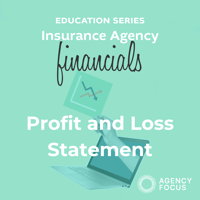Utilizing Statement of Cash Flows: A Crucial Tool for Insurance Agency Owners The final part of our...
Aligning Compensation Structures with Industry Standards
There’s a good chance you’ll agree that your most valuable asset is your team, and the insurance industry is no different. I meet people every week who have amazing team members that hold irreplaceable knowledge and skills.
In fact, the success of your agency is closely tied to the effectiveness of your team – especially your producers, account managers, and client service representatives. These key players drive revenue, maintain client relationships, and ensure retention of your clients remains high. However, one of the most critical, yet often overlooked, components of managing a successful insurance agency is developing a compensation structure that aligns with industry standards.
When your compensation structure deviates from industry norms, it can create a ripple effect, harming your agency’s profitability, reducing your ability to reinvest in growth, and even impacting the transferability of your agency during a sale.
Current Industry Compensation Structures
Before diving into the risks of deviating from standard compensation structures, let’s first outline what those standards generally look like across three key roles within an insurance agency:
Producers
Producers are the revenue drivers for your agency. Industry-standard compensation for producers typically includes a base salary plus commission on the business they generate until a producer validates and then their compensation is transitioned to 100% commission. Depending on the focus of the producer, commissions for new business can range from 35%-50% and renewal commissions may range between 25%-40%. In addition, some agencies offer incentives or bonuses tied to performance metrics such as achieving sales targets, maintaining retention rates, or cross-selling additional lines of insurance.
Account Managers
Account managers serve as the backbone of client relationships. They handle policy renewals, client inquiries, and problem-solving. Compensation for account managers is typically salary-based, with performance-based bonuses that make up a small percentage of their overall compensation. The average salary range for account managers falls between $50,000 and $80,000 annually, depending on the size of the agency, location (i.e., metro, rural, cost of living in your state, etc.), and specific responsibilities. Bonuses or commissions tied to retention or client satisfaction are common performance-based components of the overall compensation for account managers.
Client Service Representatives (CSRs)
CSRs are often the first point of contact for clients and are responsible for handling administrative tasks, customer support, and basic policy servicing. Their compensation is largely salary-based, with fewer opportunities for commissions or bonuses compared to producers or account managers. Salaries for CSRs typically range from $35,000 to $55,000, depending on experience, location (as noted above), and agency size.
The Dangers of Deviating from Industry Standards
While every agency is unique, dramatically varying from these industry-standard compensation models can lead to several negative consequences, from profitability issues, incentivizing complacency, and creating real challenges during a potential sale of your agency. Let’s take a closer look at the risks:
Impact on Profitability
Overcompensating your staff, especially producers, can significantly erode your agency’s profitability. While it’s tempting to offer higher-than-average commissions to attract top talent, this can greatly reduce your profit margins, making it difficult to reinvest in other areas of your business, such as technology or marketing.
Producers compensated at an above-market rate for renewals may also feel less pressure to focus on generating new business, leading to missed revenue opportunities. Account managers and CSRs who are paid significantly more than industry standards may lack incentives account round or improve efficiency, as they’re already receiving a comfortable salary without performance-based metrics tied to their compensation.
Conversely, undercompensating staff creates its own set of issues, such as reduced employee morale, higher turnover, and difficulties in recruiting high-performing employees. In the long run, paying below industry standards can be just as costly as overpaying, as it leads to increased recruitment and training costs.
Reduced Ability to Invest in Technology and Growth
Maintaining a balanced compensation structure is essential for ensuring you have the financial resources to invest in other critical areas of your agency, such as technology, marketing, and operational improvements. If too much of your revenue is allocated to staff salaries and commissions, you may find yourself with insufficient funds to adopt new technologies like an agency management system (AMS) or customer relationship management (CRM) platform—both of which can improve operational efficiency and client service.
With the current insurance market and the rate of change in our industry, technology is not just a luxury but a necessity. Investing in tech allows you to streamline workflows, improve the client experience, and reduce manual processes, all of which are crucial for scaling your agency. Without the ability to invest in these areas, your agency risks falling behind competitors who are leveraging technology to improve efficiency and client retention.
Challenges in Agency Transferability and Risk of Attrition
If you’re planning to sell your agency one day, having a compensation structure that aligns with industry standards is crucial for transferability. Prospective buyers want to purchase agencies with balanced financials and scalable models. If your staff is overpaid relative to industry standards, a buyer may hesitate to acquire your agency or may renegotiate the sale price to account for the higher compensation costs they’ll inherit.
Additionally, overcompensated producers or account managers may be at risk of leaving during a sale if they fear their compensation will be adjusted post-acquisition. The last thing a new owner wants is to lose key employees who have relationships with clients and can provide continuity in those accounts during transition. Losing key revenue-generating staff immediately after purchasing an agency will also impact the ongoing growth and performance expectations. When these things are in question a buyer will reduce their offer to mitigate any risk related to uncertainty surrounding the ongoing performance of the agency. Conversely, undercompensated staff may already be looking for better opportunities, making retention even more difficult during a transition.
Aligning your compensation structure with industry standards is not just about paying people fairly -it’s a STRATEGY that’s about building a sustainable and profitable business. When you overpay or underpay key roles like producers, account managers, and client service representatives, you risk diminishing profitability, reducing your ability to reinvest in technology and growth, and creating challenges for the future transferability of your agency.
A balanced, industry-aligned compensation structure helps you attract and retain top talent while ensuring your agency remains profitable and competitive. It also sets the stage for long-term growth and success, positioning your agency as an attractive acquisition target when the time comes to sell.
ABOUT THE AUTHOR
Over the past 16 years, Carey Wallace has worked with hundreds of independent insurance agencies helping them understand their agency’s value and turn that knowledge into an actionable plan for their future. She prides herself on taking the time to understand the agency’s unique situation and helping them build the future they envision for themselves. She is a Certified Exit Planning Advisor (CEPA) and provides a variety of business consulting services including valuation, perpetuation planning services, acquisition support, financial and compensation analysis, and fractional CFO services through the company she founded, Agency Focus, LLC. To learn more, please visit www.agency-focus.com



